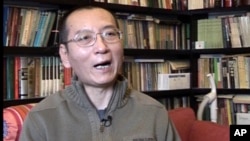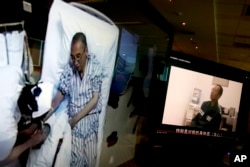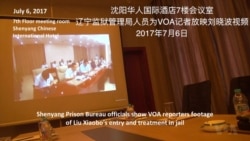Two Western physicians visited ailing Nobel Peace laureate Liu Xiaobo in a Chinese hospital Saturday and approved of the treatment he is receiving, according to the hospital.
The 61-year-old Liu was sentenced to 11 years in prison in 2009 for what his supporters call "his long and nonviolent struggle for fundamental human rights in China” before being transferred to a hospital in the northeastern city of Shenyang for treatment of terminal liver cancer.
Number One Teaching Hospital of the China Medical Sciences University said it invited the doctors, one from the U.S. and the other from Germany, to help with Liu's treatment.
The hospital identified the doctors as Joseph Herman of the M.D. Anderson Cancer Center in the U.S. and Markus Buchler of Germany's University of Heidelberg.
After reviewing Liu's medical history and a report on his treatment, the doctors, accompanied by Chinese experts who are treating Liu, discussed his condition with him and family members, the hospital said.
"The U.S. and Germany experts fully approved of the treatment by the national experts group and what they had done," the hospital said in a statement.
Liu was jailed following a conviction of "inciting subversion of state power" after he helped write a petition known as Charter 08 that called for democratic reforms in China.
He was granted medical parole to the hospital in late June.
On Friday evening, the hospital said that Liu's appetite was "quite poor" and that abdominal fluid that had built up had been drained.
New security measures
Security at the hospital has increased over the past few days. A section on the 23rd floor was blocked off with screens. A VOA reporter attempting to get behind the screen was stopped by men on the other side of the screen.
Two people guarded the elevator on the 23rd floor. A delivery man with food for an unknown patient was told to wait as guards called family members to pick up the order. Both the delivery man and the patients’ family told VOA that the security procedures were new, and are found on no other hospital floor.
WATCH: VOA Reporter Finds High Security at Hospital Where Liu Is Being Treated
On Thursday, Liu's brother-in-law, Liu Hui, denied that doctors had halted medication for him, in a letter released by the hospital, following rumors that the dissident was too ill for treatment to continue.
A family friend of Liu said his medication had been halted as his liver was unable to take it.
"The Chinese government often pressures family members to write statements or record videos to make claims in its favor," Patrick Poon, a China researcher for rights group Amnesty International, said in a message to Reuters, referring to the letter.
"If Liu Hui is free, why can't he talk to journalists?" added Poon, who is based in Hong Kong.
Calls have grown from rights groups, international bodies and Western governments for China to allow Liu and his wife, Liu Xia, to be treated overseas if they wish.
Since 2009, China has ignored international calls to free Liu while isolating him. His wife, Liu Xia, has been under strict house arrest in Beijing although she’s never been accused of any crime. Since receiving medical parole, Liu, his wife and family members have been largely prevented from communicating with the outside.
The European Parliament on Thursday urged China to immediately release the couple from house arrest, and allow Liu to seek treatment freely.
Beijing declines to comment
Chinese Foreign Ministry spokesman Geng Shuang declined on Friday to comment about Liu's treatment and media access to his family.
However, he expressed displeasure at the involvement of the United Nations, after Zeid Ra'ad al-Hussein, the U.N. high commissioner for human rights, met Chinese officials about Liu.
"Relevant U.N. officials should strictly abide by the U.N. charter's purposes and principles, should respect China's judicial sovereignty and not interfere in China's internal affairs," Geng told a daily news briefing.
The U.N. human rights office on Friday said it was very concerned about reports of serious deterioration in Liu's health.
"The high commissioner has requested that a senior U.N. official be urgently granted access to Liu Xiaobo and to Liu Xia," it said in a briefing note. "However, we have so far received no response from the Chinese government to this request."
This report from Shenyang, China, was originated by VOA Mandarin.
















